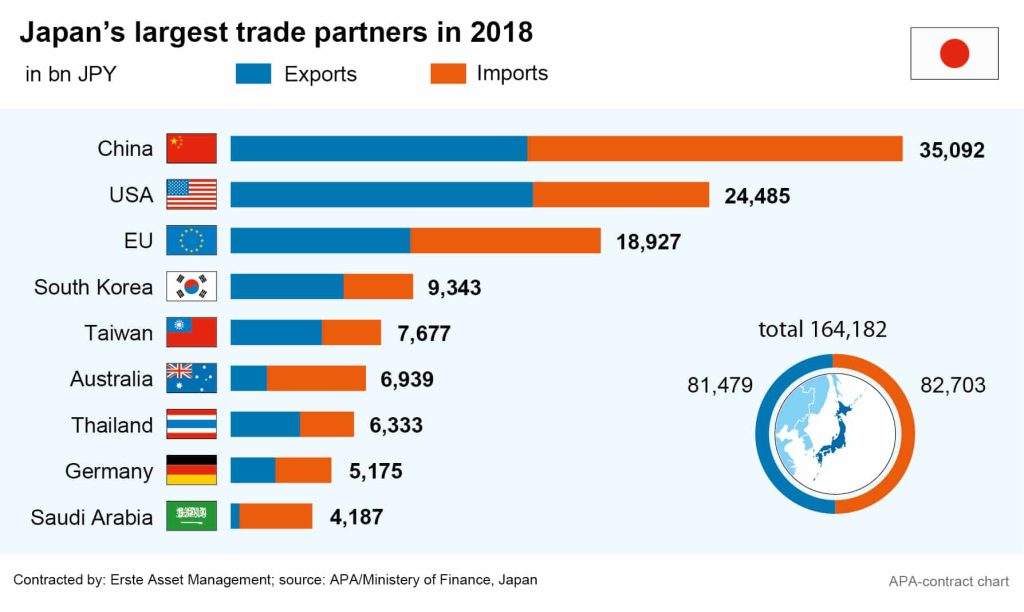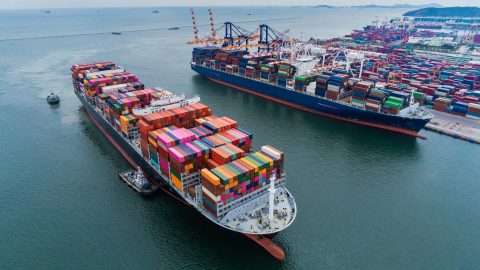
Japan is currently affected on several levels by US President Donald Trump’s trade policy. On the one hand, the heavily export-dependent Japanese economy is feeling the effects of the US trade conflict with China; on the other hand, Japan is currently negotiating its own trade relations with the US. After his recent state visit to the country, Trump had urged Japan to quickly sign a trade deal.
The goal of the negotiations is a free trade agreement between the two countries and an expansion of economic relations. However, Japan’s large trade surplus with the US bothers Trump, who wants to correct this imbalance in the negotiations. In 2018, the USA had a trade deficit with Japan of around USD 67.6bn.

Note: Past performance is not indicative of future development.
Free trade agreement to be sought
Consequently, the US president is calling for Japan to open its market wider to US products, such as agricultural goods. However, a significant portion of the surplus is a result of Japan’s car exports to the USA. The US government is therefore considering additional import duties on Japanese cars, a measure that Japan absolutely wants to avoid. On this point, the negotiating partners are unlikely to find any consensus soon.
Japan’s monetary policy has also been repeatedly criticised in the past. The country is accused of keeping the yen low through an ultra-loose monetary policy in order to maintain lower prices for its products abroad and improve its export opportunities. In order to support the economy, the central bank has been keeping its interest rates at practically zero for a long time while also trying to keep yields on the capital market at around zero by buying government bonds.
In view of the uncertain economic outlook, the currency authorities announced after their monetary policy meeting at the end of April, that Japan’s central bank intends to maintain very low interest rates for at least another year, as Japan is also affected by the US trade dispute with China, resulting in weak demand from China as well as impacting supply chains.
Japan’s economy surprisingly strong recently despite decline in exports
For the fifth consecutive month, Japan’s companies sold fewer goods abroad in April. Exports declined by 2.4 per cent compared to the previous year, according to Japan’s Ministry of Finance. Exports to China dropped even more – by 6.4 per cent – according to official statistics. (Source Japanese Ministry of Finance, http://www.customs.go.jp/toukei/shinbun/trade-st_e/2018/2018_117e.pdf)
Japan’s economic performance has not yet been affected by weakening exports. The decline in exports was however recently mitigated by an even stronger drop in imports. Japan’s gross domestic product (GDP) grew by a surprisingly strong 2.1 per cent in the first quarter, whereas Analysts had anticipated an average decline of 0.2 per cent. At the end of 2018, Japan’s economic output had shown a growth of 1.6 per cent.
However, experts warn of an impending economic downturn. “The economy has already reached its peak,” said Hiroaki Muto, chief economist at the Tokai Tokyo Institute. The economist is expecting a potential slight recession. Many experts therefore expect Prime Minister Shinzo Abe to postpone the increase in VAT from eight to 10 per cent previously announced for October.
Legal note:
Prognoses are no reliable indicator for future performance.
Legal disclaimer
This document is an advertisement. Unless indicated otherwise, source: Erste Asset Management GmbH. The language of communication of the sales offices is German and the languages of communication of the Management Company also include English.
The prospectus for UCITS funds (including any amendments) is prepared and published in accordance with the provisions of the InvFG 2011 as amended. Information for Investors pursuant to § 21 AIFMG is prepared for the alternative investment funds (AIF) administered by Erste Asset Management GmbH pursuant to the provisions of the AIFMG in conjunction with the InvFG 2011.
The currently valid versions of the prospectus, the Information for Investors pursuant to § 21 AIFMG, and the key information document can be found on the website www.erste-am.com under “Mandatory publications” and can be obtained free of charge by interested investors at the offices of the Management Company and at the offices of the depositary bank. The exact date of the most recent publication of the prospectus, the languages in which the fund prospectus or the Information for Investors pursuant to Art 21 AIFMG and the key information document are available, and any other locations where the documents can be obtained are indicated on the website www.erste-am.com. A summary of the investor rights is available in German and English on the website www.erste-am.com/investor-rights and can also be obtained from the Management Company.
The Management Company can decide to suspend the provisions it has taken for the sale of unit certificates in other countries in accordance with the regulatory requirements.
Note: You are about to purchase a product that may be difficult to understand. We recommend that you read the indicated fund documents before making an investment decision. In addition to the locations listed above, you can obtain these documents free of charge at the offices of the referring Sparkassen bank and the offices of Erste Bank der oesterreichischen Sparkassen AG. You can also access these documents electronically at www.erste-am.com.
Our analyses and conclusions are general in nature and do not take into account the individual characteristics of our investors in terms of earnings, taxation, experience and knowledge, investment objective, financial position, capacity for loss, and risk tolerance. Past performance is not a reliable indicator of the future performance of a fund.
Please note: Investments in securities entail risks in addition to the opportunities presented here. The value of units and their earnings can rise and fall. Changes in exchange rates can also have a positive or negative effect on the value of an investment. For this reason, you may receive less than your originally invested amount when you redeem your units. Persons who are interested in purchasing units in investment funds are advised to read the current fund prospectus(es) and the Information for Investors pursuant to § 21 AIFMG, especially the risk notices they contain, before making an investment decision. If the fund currency is different than the investor’s home currency, changes in the relevant exchange rate can positively or negatively influence the value of the investment and the amount of the costs associated with the fund in the home currency.
We are not permitted to directly or indirectly offer, sell, transfer, or deliver this financial product to natural or legal persons whose place of residence or domicile is located in a country where this is legally prohibited. In this case, we may not provide any product information, either.
Please consult the corresponding information in the fund prospectus and the Information for Investors pursuant to § 21 AIFMG for restrictions on the sale of the fund to American or Russian citizens.
It is expressly noted that this communication does not provide any investment recommendations, but only expresses our current market assessment. Thus, this communication is not a substitute for investment advice.
This document does not represent a sales activity of the Management Company and therefore may not be construed as an offer for the purchase or sale of financial or investment instruments.
Erste Asset Management GmbH is affiliated with the Erste Bank and austrian Sparkassen banks.
Please also read the “Information about us and our securities services” published by your bank.



